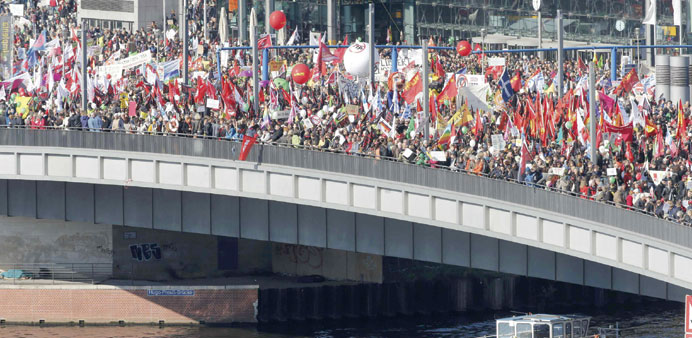Reuters/Berlin
Hundreds of thousands of people marched in Berlin yesterday in protest against a planned free trade deal between Europe and the United States that they say is anti-democratic and will lower food safety, labour and environmental standards.
Organisers - an alliance of environmental groups, charities and opposition parties - said 250,000 people were taking part in the rally against free trade deals with both the United States and Canada, far more than they had anticipated.
“This is the biggest protest that this country has seen for many, many years,” Christoph Bautz, director of citizens’ movement Campact told protesters in a speech.
A police spokesman estimated 100,000 people were taking part in the demonstration which has been trouble free so far. There were 1,000 police officers on duty at the march.
Opposition to the so-called Transatlantic Trade and Investment Partnership (TTIP) has risen over the past year in Germany, with critics fearing the pact will hand too much power to big multinationals at the expense of consumers and workers.
“What bothers me the most is that I don’t want all our consumer laws to be softened,” Oliver Zloty told Reuters TV. “And I don’t want to have a dictatorship by any companies.”
Dieter Bartsch, deputy leader of the parliamentary group for the Left party, who was taking part in the rally said he was concerned about the lack of transparency surrounding the talks.
“We definitely need to know what is supposed to be being decided,” he said.
Marchers banged drums, blew whistles and held up posters reading “Yes we can - Stop TTIP.”
The level of resistance has taken chancellor Angela Merkel’s government by surprise and underscores the challenge it faces to turn the tide in favour of the deal which proponents say will create a market of 800mn and serve as a counterweight to China’s economic clout.
In a full-page letter published in several German newspapers yesterday, economy minister Sigmar Gabriel warned against “scaremongering”.
“We have the chance to set new and goods standards for growing global trade. With ambitious, standards for the environment and consumers and with fair conditions for investment and workers. This must be our aim,” Gabriel wrote.
Businesses hope the trade deal will deliver over $100bn of economic gains on both sides of the Atlantic.
“A fair and comprehensive free trade deal promotes growth and prosperity in Europe. We should actively participate in the rules for world trade of tomorrow,” Ulrich Grillo, head of the BDI Federation of German industries, said in a statement.
“Never before have we seen so many people take to the streets for this issue,” the German trade union confederation DGB, which helped organise the protest, said on Saturday.
Several trains and more than 600 buses had been chartered to transport protesters to the capital, who marched carrying sigs that read “Stop TTIP” and “TTIP signals climatic shipwreck”.
Opponents say the deal would lead to widespread deregulation and reduce the scope of government.
“We are here because we do not want to leave the future to markets, but on the contrary to save democracy,” said Michael Mueller, president of the ecological organisation German Friends of Nature.
Talks on the pact between the US and 28-nation EU -- which would be the world’s biggest trade deal if completed -- began in 2013 and the two sides aim to conclude them by 2016.
Campaigners are particularly angered over Washington’s insistence that as part of the pact, private companies be allowed to sue governments before special tribunals.

Consumer rights activists take part in a march to protest against the Transatlantic Trade and Investment Partnership in Berlin yesterday.
